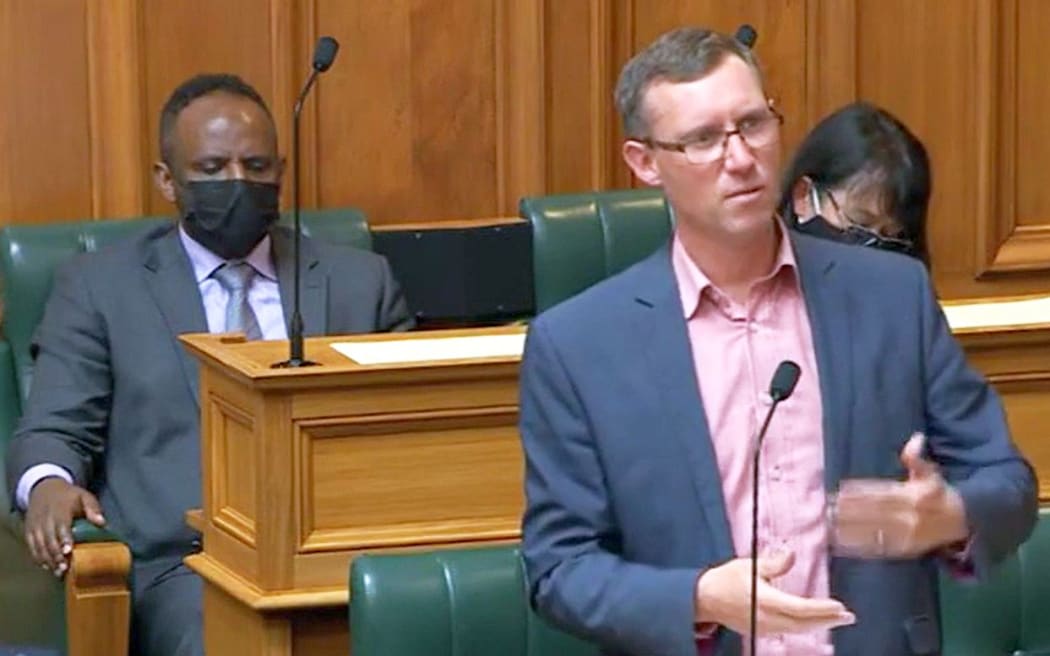Government MPs commended it to the House and opposition figures condemned it, but the Bill setting out the role and obligations of a new public media entity easily passed its first reading this week.
Members of the public can now have their say on the plan as a parliamentary committee scrutinises the Aotearoa New Zealand Public Media Bill over the next six months.

Labour MP Jamie Strange commend the Aotearoa New Zealand Public Media Bill to the House last Tuesday. He chair the Select Committee that will scrutinise the Bill - and consider public submissions which are open until 8 September 2022. Photo:
When the new Minister of Broadcasting Willie Jackson introduced the Aotearoa New Zealand Public Media Bill to parliament earlier this month, they ran out of time for all the speeches at the first reading.
That wrapped up last Tuesday when parliament resumed again and, given that this is a government initiative opposed only by National and Act, the bill was passed comfortably last Tuesday by 77 votes to 42.
The bill aims to create a public media entity that would operate as an autonomous crown entity, with editorial independence which would;
· provide relevant and trusted public media content across a range of platforms, including television, radio, and digital platforms.
· operate based on a charter which emphasises independence, impartiality, and balance.
· have a board with expertise in tikanga and te ao Māori as well as financial management.
But five more MPs took their chance to commend the bill to the house - or condemn it - last Tuesday.
National’s Joseph Mooney was not convinced it would help represent all the people and voices out there or, as the government claimed.
“This mega mega merger, this major entity, is going to reduce the plurality, and reduce that diversity of opinion and diversity of structures in our media landscape,” he said.
Labour's Naisi Chen then spoke about the streaming habits of the younger generation, without quite making it clear how the bill related to that.
She was followed by Labour's Barbara Edmonds who also talked up the digital opportunities.
“We need strong, independent journalism. But you can't have that if all that your children are watching is YouTube, because that's just the way of this world,” she said.
She said the bill “creates a future-proofed model.” But National’s Michael Woodhouse cast doubt on whether the bill would be change-of-government-proof.
He reiterated his party's objection on the grounds of the cost during a cost of living crisis.
“I think what Barbara Edmonds has just demonstrated to the house - as a fellow Gen Xer - is that we the parents do not understand how our children are getting their content.
"But it ain’t through TVNZ and RNZ. And it's not going to be, despite her claims about a merged entity of the two. Content matters more than platform,” he said.
The last to address the house before the vote was Labour MP Jamie Strange (who was supposed to have spoken earlier, but the speaker had overlooked him).
“This bill is simply . . . responding to a change in New Zealand society and New Zealand culture. I look forward to going through this and seeing what what we hear from the public on it,” he said.
Jamie Strange is current chair of parliament’s Economic Development, Science and Innovation (EDSI) committee which will scrutinise the bill over the next six months - and it will be the first opportunity for New Zealanders to have a say on a plan developed behind closed doors
Strange was also the chair when the same committee ordered an inquiry into the review of the RNZ Charter, even though the days of that charter were numbered because ANZPM will have a brand new charter of its own.
In spite of that, more than 60 submissions were made to that inquiry.
The closing date for submissions on the Aotearoa New Zealand Public Media Bill is 8 September 2022. The EDSI committee is due to report back in January 2023.

